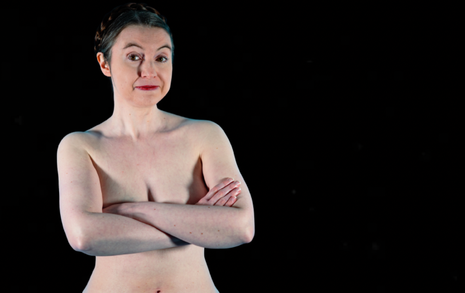Victoria Bateman: ‘When I was a teenage girl, you were basically written off as a little hole’
She’s the infamous Cambridge professor baring it all to protest Brexit and female modesty

“I could talk for Britain,” says professor Bateman once we reconvene over Zoom. Only moments earlier, our call had reached its 40 minute expiration and, in that time, I had barely managed to ask three questions. “Do you know when I went on Times Radio a couple weeks ago, the host said to me, if there’s one thing you’re better at than naked protesting, it’s talking”.
Talking comes naturally to this unusually friendly don (she had kindly sent me a copy of her book in the post), but so too does controversy. We meet a fortnight after Bateman became surely the first fellow to have their book banned by Amazon. The online giant told Bateman that the cover of ‘Naked Feminism’, which partially depicts her stomach and breasts, was too “sexually suggestive”.
“Amazon were adamant, no, my book cover was too sexually suggestive to be advertised on Amazon,” she says. “And no matter how much my publishers defended it, and how much we made the case, they were not backing down until the media got got on the case”.
“Growing up in the 1990s, when I was a teenage girl, you were basically written off as a little hole”
A fellow and director of studies at Gonville & Caius, Bateman rose to prominence following the 2016 referendum. With the words “Brexit leaves Britain naked” blazoned across her chest in black felt-tip, she made appearances across TV and radio to protest Brexit in her birthday suit.
“In some ways, I feel sorry for the interviewer,” she admits. “Because, of course, even even though they have, you know, typically agreed to it and are expecting it, and so on, still, it’s probably not their standard interview".
In the intervening years, she has written two books: ‘The Sex Factor: how women made the West rich’ and, more recently, ‘Naked feminism: breaking the cult of female modesty’.
The descendant of cotton mill workers, Bateman grew up in Oldham in the 80s and 90s. It was a rough time. Bateman describes widespread poverty and unemployment. “It was in serious decline,” she remembers. “There was increasing poverty, and joblessness, and a lot of social problems with that”. While ambitious and smart, Bateman felt she had been written-off at school. “At the time I was growing up in the 1990s, when I was a teenage girl, you were basically written off as a little hole,” she says. “I felt I had to guard my body and… bodily reputation in order to be heard in order to be taken seriously”.
Bateman would later matriculate at Cambridge and while it was quite the culture shock, she felt that by the end of her first term she finally belonged. “I felt like I had found somewhere that I could fit in, where I was surrounded by people who looked beyond the superficiality”. A Masters and PhD at Oxford would follow. But even as she collected these degrees, she felt that others still questioned her credentials. “[they would] throw accusations like ’Oh, you must have slept your way to all of your degrees, because someone like you couldn’t possibly passed all those exams”.
“I stripped off first thing, walked into my first meeting of the day naked”
In many ways the naked protests of this Caius Fellow did not begin with Brexit. Female modesty, the subject of her latest book, was what first inspired her to strip off. “So I would say the very first time that I used my body in the public sphere was actually in an artistic sense. So in 2014, a nude portrait of me went on display at the mall galleries in London”. Bateman was particularly surprised by how the visitors would react to the portrait. “I could see when I was there at the exhibition myself, I could physically see the way that people would jump back from the painting, when they read the little label, and saw that this was an academic woman”.
Bateman’s first naked protest against Brexit would only happen in 2016, in a faculty meeting following the end of the academic year. “So I stripped off first thing, walked into my first meeting of the day naked. And, naturally, as I walked in the room, I’m not sure people were expecting me to walk in naked”. The reception amongst colleagues was largely positive. “There was a lot of understanding, I would say that immediately after that meeting, actually, a couple of colleagues stayed behind to talk to me in the corridor afterwards”.
One thing Bateman has learned, however, is that appearances can be deceptive. Following both protests, she made the unfortunate discovery that it was often the fellowship’s self-proclaimed feminists who took the greatest issue with how she decided to use her body. “And then others who you might expect to be more open minded and tolerant, I realised that wasn’t always the case. And actually, I would say some of the people that have been most opposed to me using my body have been other women. And interestingly, other women that would call themselves feminists”.
I had noticed that too. A quick Google search or a cursory glance at Bateman’s Twitter reveals a vitriolic underbelly of hate. Abuse in the name of ‘feminism’. Had she foreseen such a backlash? “I would say some of the responses [I have] received were entirely predictable. I mean any woman who puts her body out there… you’re going to get lots of judgments and comments…But I think what I had been much less able to predict was this negative reaction from other women who were themselves intellectual women who start to see you as being their enemy”.
“This puritanical undercurrent has always existed within feminist movements”
Since her decision to protest naked, Bateman tells me that two female colleagues at the University no longer speak to her. While they used to partake in perfectly pleasant small talk only a few years prior, they now avoid her completely. Bateman claims that “some within Cambridge…have in a sense ostracised me for what I’ve done”. Why had they been so hostile? “Women in the economics profession [have] fought their whole lives to get women’s bodies off the table,” she explains. “And I was putting them on the table. And that was an embarrassment, it was a backward move”.
Perhaps the most egregious incident took place at the World Economic Society in 2018. “I did hold a naked protest at the World Economic Society annual conference in 2018. And my naked protests are always as respectful as they possibly can be…But a senior woman, a particular senior woman objected, and I was removed from the room. I was put into a room on my own, until she could come and talk to me. She lectured me for quite some time on how I was an embarrassment to women in the economics profession…on how she and other women in the economics profession had fought their whole lives to get women’s bodies off the table. And I was putting them on the table”.
Bateman argues that this puritanical undercurrent has always existed within feminist movements. Feminists since the suffragettes, according to Bateman, have long built their respectability on bodily reputation. “I found quite quickly that there has long been a thorough tyrannical strain within feminism. And when you look back at, say, the suffragettes… [they] built their respectability on the idea of bodily purity, on being very modest, on being very chaste…Elizabeth Wolstenholme, who was a suffragette from Manchester, so not far from where I grew up, she was pushed out and side-lined by the movement because she got pregnant outside marriage
But Gonville & Caius has stood by Bateman throughout this media storm, defending her against demands that she resign from members of the public. “The master at that time, Prof Fersht, who I’ve always got on with extremely well was amazingly supportive,” she says. “He stood up for me on the basis of free speech and free expression…and said she’s not doing anything illegal…she is doing it in a very controlled way”.
Certainly, Bateman has come under criticism by some for flashing. “So if you read the media, they, of course, sometimes like to give the impression that every lecture you’re giving, and every supervision you’re giving is naked, when the vast majority of my time I’m wearing a suit,” she agrees. “I use naked protest in a very carefully chosen and very controlled way to get my message out there. And more days than not, I’m wearing clothes. So no, I do use it in a very strategic way”.
Bateman is about to start a media tour in the US. How does she think they’ll react to her antics across the pond? “I’m not sure how it will go in the US, because I think the US tends to be a little bit more puritanical than we are here in the UK”.
 Features / Beyond the porters’ lodge: is life better outside college?24 February 2026
Features / Beyond the porters’ lodge: is life better outside college?24 February 2026 News / Cambridge academics sign open letter criticising research funding changes22 February 2026
News / Cambridge academics sign open letter criticising research funding changes22 February 2026 Theatre / Footlights Spring Revue? Don’t Mind if I Do!25 February 2026
Theatre / Footlights Spring Revue? Don’t Mind if I Do!25 February 2026 Fashion / The evolution of the academic gown24 February 2026
Fashion / The evolution of the academic gown24 February 2026 News / Student and union protesters hold ‘Trans Liberation Solidarity Rally’ 24 February 2026
News / Student and union protesters hold ‘Trans Liberation Solidarity Rally’ 24 February 2026









![How to Create an Attractive Freelancer Portfolio [5 Tips & Examples]](https://www.varsity.co.uk/images/dyn/ecms/320/180/2026/02/vitaly-gariev-ho2tNOWZYXM-unsplash-scaled.jpg)
